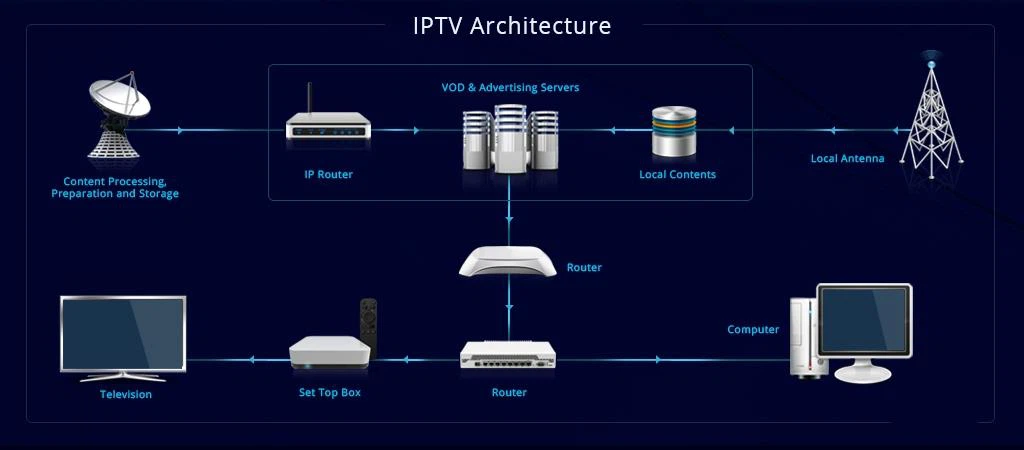IPTV: Television in the Digital Age
Internet Protocol Television
In the rapidly evolving world of technology, traditional television viewing has undergone a significant transformation. Enter IPTV (Internet Protocol Television), a revolutionary way to watch TV content over the internet, which is reshaping how we access and enjoy television programs. With the growing demand for on-demand content and seamless streaming experiences, IPTV is becoming an increasingly popular choice for consumers worldwide.
What is IPTV?
IPTV stands for Internet Protocol Television, a system that delivers television content using the internet protocol (IP) rather than traditional satellite or cable formats. Instead of receiving content through radio frequency (RF) signals or satellite dishes, IPTV transmits television signals over the internet. This system provides an opportunity to watch television shows, movies, sports, and live events on a wide variety of devices like smart TVs, computers, smartphones, and tablets.
Unlike traditional TV, which is broadcasted in real-time, IPTV allows viewers to enjoy content whenever they want, essentially creating a personalized television experience. There are three main types of IPTV services:
Live TV: As the name suggests, IPTV allows you to watch live television broadcasts like sports events, news, and other real-time programming, just as you would on traditional TV.
Video On Demand (VOD): With VOD, IPTV offers an extensive library of movies, shows, and documentaries that you can watch at your convenience, similar to streaming platforms like Netflix and Hulu.
Time-shifted TV: This feature enables you to pause, rewind, or fast forward live television broadcasts, ensuring you never miss your favorite moments.

Advantages of IPTV
Flexibility and Convenience: One of the main reasons IPTV has become a preferred choice for many is its convenience. Viewers can access content on-demand from virtually any device with an internet connection. Whether you’re on your laptop, phone, or smart TV, IPTV offers flexibility in how and where you watch content.
Wide Range of Content: With IPTV, users have access to a broad array of channels, shows, movies, and sports, offering far more variety compared to traditional cable services. Additionally, many IPTV services offer niche content and specialized channels, providing viewers with diverse programming that suits their interests.
Cost-Effective: IPTV often provides a more affordable option than traditional cable and satellite TV services. With the ability to choose packages that suit your needs and a reduction in the number of unwanted channels, IPTV is a cost-effective solution for those looking to streamline their entertainment spending.
High-Quality Streaming: IPTV services deliver high-definition (HD) or even 4K streaming, ensuring an enhanced viewing experience. As long as you have a stable internet connection, you can enjoy sharp, clear visuals and immersive sound.
Interactivity and Additional Features: IPTV offers interactive features like catch-up TV, pausing live TV, and integration with apps and other internet-based services. For example, some services even allow you to watch programs on multiple screens simultaneously or share content with others.
How Does IPTV Work?
IPTV works by converting television signals into digital data that can be transmitted over an internet connection. This process involves encoding the video, audio, and metadata into a digital format that is streamed over IP networks. To view IPTV content, you typically need a set-top box or an app (on compatible devices) that decodes this digital signal and displays it on your screen.
The content is delivered via a dedicated server that stores and organizes the media. The server sends content packets over the internet, which are then received by your device, allowing you to watch television without the need for a physical broadcast signal.

IPTV and the Future of Television
As traditional cable services decline in favor of digital platforms, IPTV is seen as the future of television. With its emphasis on internet-based delivery, it offers unprecedented convenience, flexibility, and access to content. The growing adoption of fiber-optic internet networks, 5G technology, and smart devices ensures that IPTV will only continue to grow in popularity.
For consumers, the appeal of IPTV lies in the ability to choose from a vast library of content, watch live events in real-time, and enjoy personalized viewing experiences without being tied to rigid schedules or expensive subscription plans.
As the world of television continues to adapt to the digital age, IPTV is positioning itself as a leading force in the entertainment industry. Whether you’re looking to catch up on your favorite show, watch live sports, or explore new genres, IPTV is the technology that brings the future of television to your fingertips.
Conclusion
IPTV represents a bold leap forward in how we consume television content. With its flexibility, affordability, and vast range of programming, IPTV is reshaping the entertainment landscape, offering viewers more control over their television experiences. As technology continues to advance, IPTV will remain a key player in the digital television revolution, delivering high-quality content and features designed to meet the needs of modern viewers.
For those seeking an adaptable, cost-effective, and high-quality television solution, IPTV is the way of the future. Whether for personal use or business applications, IPTV is redefining the way we watch television in the digital age.
CONTACT US


